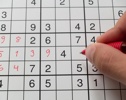I already do crosswords and sudoku. Do I need anything else?
 Here is question seven of 25 from Brain Fitness 101: Answers to Your Top 25 Questions. To download the complete version, please click here.
Here is question seven of 25 from Brain Fitness 101: Answers to Your Top 25 Questions. To download the complete version, please click here.
Question:
I already do crosswords and sudoku. Do I need anything else?
Key Points:
- Recreational activities like crossword puzzles, sudoku, bridge, chess, poker, etc. are all good for you and better than doing nothing.
- BUT, recreational activities are limited in their range of mental cross-training as well as difficult to control for both challenge and novelty.
Answer:
What you’re doing is fun and can’t hurt. But nor is it complete. Recent recommendations made by a panel of experts reviewing a poll by the American Society on Aging stated “A single activity, no matter how challenging, is not sufficient to sustain the kind of mental acuity that virtually everyone can achieve.”
Using your brain to solve creative challenges is excellent practice and will help slow down the effects of aging. The limitation with your current brain workout program is that it does not have enough variety or novelty to work out all your mental muscles. Have you ever seen the guys in the gym with the buff upper bodies supported by little chicken legs? The same thing can happen in your brain. Just as you cross-train in your physical fitness routine (mixing cardio with strength training and flexibility) to get a balanced workout, you need to cross-train your mental fitness to exercise your brain through motor coordination, emotional understanding, memory, focus and attention, sensory processes, communication, language skills, and mental visualization.
Furthermore, how can you gauge your improvement if you don’t have a way to measure it? Using computer software to give you a baseline score, workout routines for your brain, and follow up tests gives you a measure of your improvement. So basically, right now you may be doing a highly focused workout using language and memory but with inconsistent challenge and limited feedback. A structured program should give you assessment, novelty, and performance-based challenge while still being fun. That mental stimulation can dramatically increase the rate of neurogenesis, or the creation of new neurons and the connections between neurons.
A randomized controlled double-blind study published in August 2006 “demonstrates that intensive, plasticity-engaging training can result in an enhancement of cognitive function in normal mature adults.” Challenging cognitive function leads to learning and neurogenesis. So keep doing crosswords and sudoku, especially if you enjoy them, but don’t neglect the rest of your brain!
Conclusion:
Do activities you enjoy, but be sure to do things that challenge you with new and different types of stimulation.
Further Reading
- Gamon D. and Bragdon A. Building Mental Muscle: Conditioning Exercises for the Six Intelligence Zones (Walker & Company; 2003). ISBN: 0802776698
- Mahncke HW, Connor BB, Appelman J, et al. Memory enhancement in healthy older adults using a brain plasticity-based training program: a randomized, controlled study. Proc Natl Acad Sci USA. 2006;103:12523–8.
- Scarmeas N, Stern Y. Cognitive reserve and lifestyle. J Clin Exp Neuropsychol. 2003;25:625–33.
- Willis SL, Tennstedt SL, Marsiske M, et al. Long-term effects of cognitive training on everyday functional outcomes in older adults. JAMA. 2006;296:2805–14.



The February issue of Men’s Journal article on pg. 48, titled “Your Brain on Video Games†showed a picture of a brain in several activities as captured with an MRI showing blood flows to it. There are several activities mentioned but none such as the development of a 3‑D design of a building within a landscape, or the composition of a song, or some other brain storming ideation activity. I am wondering if such studies have been done. One of the greatest pleasures I can obtain is to develop a creative design solution to a problem. It is almost as if I can stimulate my own endorphen flow, anytime I want, just by thinking of new ideas.
Great comment James! Essentially any challenging mental work will be good for your mind. New activities use more of your brain as you are learning. And activities that use many different cognitive abilities (motor coordination, visualization, spatial rotation, computation, etc.) use more of your brain. So, keep doing what you’re doing — it’s good!
Check out the Whitehead Lectures on Cognition, Computation, & Creativity or this PET study of creativity.